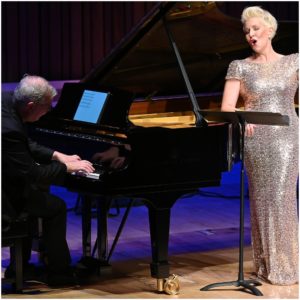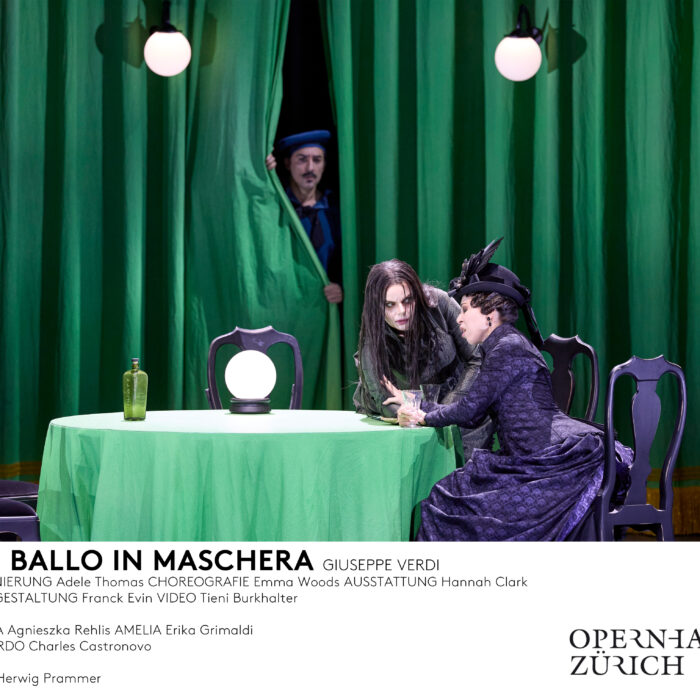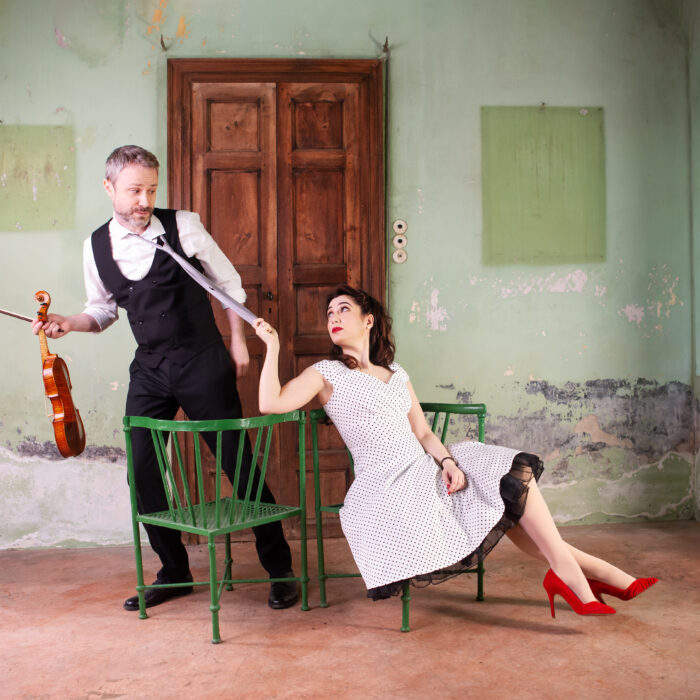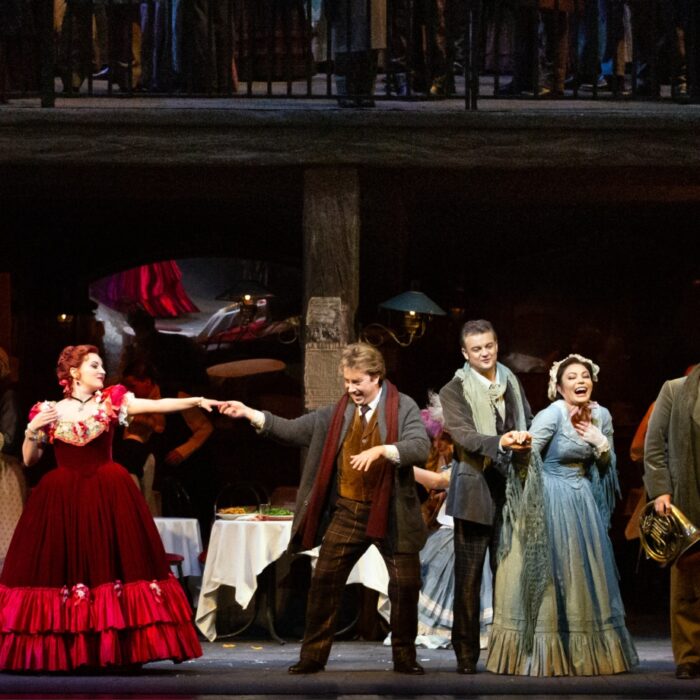
Barbican Centre 2021-22 Review: Joyce DiDonato in Recital
Serenades took flight to the sublime in scintillating executions by the malleable mezzo and accompanist Craig Terry.
By Sophia Lambton(Credit: Mark Allan/Barbican)
Long before they looped the décolletés of 1920s flappers, spiraled pearls ran rings around the ocean’s ornamental output in the form of frothy swirls: white whorls whose limpid luminosity brought earthly jewelry into pre-antiquity.
Seven tiers of snowy marble in a staircase or a wedding cake can spark a similar entrancement in our ultra-modern times. As can the imaging of spinning soundwaves taking flight at music’s entrance to the ether.
Phenomena like these are slow to lend themselves to an immediate comparison, trapped as each era is by the confinement of its trimmings. Yet when our only natural instrument is coiled to fashion both the elements’ unending exploits and a synthesizer’s pitch bends, we’re reminded that the human voice was first to bear elastic artistry.
Limberness applies as equally to the unspooling ribbons of Joyce DiDonato’s instrument as it does to occurrences contrived and real; spontaneous and unnatural. In a recital with pianist Craig Terry at the Barbican Centre in London her performance drew parallels between the seas’ beating waves and a flute’s withered siren; blinking sunlight and trills’ teasing lures. Nature was music – and yet music had evolved beyond it.
Despair debuted in the beginning. Embracing four arias from Haydn’s “Arianna a Naxos”, DiDonato embodied the mythical girl plagued with pain after leaving her land and her father for Theseus’ treacherous arms. Blind love was bolstered by her urgently stretched, cavernous crescendo over “Ah, vieni, ah vie-e-e-e-ni, o caro” then simmered down in shyness as she came to “stringi, stringi con nodo più tenace” to show the girl receding bashfully from her precocious declarations.
Enchantment was delivered in the form of pitch bends as piquant as pieces on the deity Pan’s flute as DiDonato dipped into “Dove sei, mio bel tesoro?” Herein her voice became as onomatopoeically vast as the enormous straits it sought to capture in the phrase “Teseo non mi risponde, e portano le voci e l’aure e l’onde.” As she realized that the hero was no more a savior for her, the mezzo’s Ariadne expressed shock with a wide vowel on “abbandono” before shrinking her protagonist’s scared voice with “Più speranza non v’è.”
Emanating the idylls evoked in Mahler’s Rückert-Lieder, DiDonato let her voice linger and languish in diminuendo at the culmination of “Ich atmet einen linden Duft;” symbolizing an escaping waft with the eventual dissolution of her imitating instrument.
Love’s recklessness crept into “Liebst du um Schönheit” as her character urged, “Liebe mich immer,” with a forceful vibrato-crescendo that carried “im….mer”. Bliss peaked in the beloved song “Ich bin der Welt gestorben” as the narrator predicts a peaceful separation from the world’s tumultuousness in the line “Ich bin gestorben dem Weltgetümmel,” dimming it until slow contemplation sealed its silence. Nature’s effects were palpable through DiDonato’s crafting of this ode to stillness; mimicking a butterfly’s swift, flapping wings through her vibrato as she cited “meinem Leben” – almost as if to juxtapose a mortal’s lifespan with the day-long journey of the trembling migrant.
In the last piece from the selection, “Um Mitternacht,” fear of one’s own physiology was audible in a crescendo on “Die Schläge meines Herzens.” Hollow was the doom of pitch-black loneliness as a vibrato-laden furor lay an angry siege to the prophetic words “Es hat kein Lichtgedanken mir Trost gebracht;” fearful awe embraced “Du hältst die Wacht um Mitternacht.”
With seamless easiness chromatic scales let loose across “Morte col fiero aspetto” from Hasse’s “Marc’Antonio e Cleopatra” while Dido’s stilling shock held sway after a futile prayer in “Ah! Ah!, Je vais mourir” from Berlioz’s “Les Troyens.” As she implored the mother of her ex-lover Aeneas, Venus, to return her son, the heroine paused pointedly before a metatextual commentary: “Inutile prière,” she mused in augury – killing the “ère” of “prière” with a hope-deprived diminuendo.
Twisting Giordani’s ubiquitously executed song, “Caro mio ben” into a Gershwin-like expulsion oozing streams of glistening glissandi, improvisation and a take on “Twinkle, Twinkle, Little, Star,” Craig Terry’s accompaniment carried DiDonato’s voice through his “American Songbook” rendition of the late-eighteenth century standard. Ella Fitzgerald could be heard in portamenti on such syllables as “te” in “senza di te;” airy crescendi wrapped the vowels in satin. Riffing was rampant as the mezzo played with the remodeled notes spontaneously; echoing a jazz band’s bass performer using rests to spin the instrument.
Almost humming on the “j’appartiens” of “La Vie en Rose,” DiDonato lent the song a hypnotized enamorment. Her voice pulsated with excitement on the clambering crescendo of “qui bat.” An English version of the song most popularly sung by Louis Armstrong saw her turn the “songs” of “love songs” into a staccato trill and melismas.
For the first encore, DiDonato tuned back to a classical selection to offer a paradigm of the tenacious, timid Cherubino in “Voi, che sapete” from “Le Nozze di Figaro”. Immediately the lilts which she’d toyed with were in a twentieth-century style, yet still packed in the character of a diffident and gawky teenager who hides behind floppy eighteenth-century hair.
But Cherubino was rapidly abandoned as DiDonato let loose in Irving Berlin’s “I Love a Piano;” flirting amusingly with a refined fluidity; loath to let risks endanger her technique.
Artifice was camouflaged in authenticity to flaunt an inborn art. Through well over two centuries of music DiDonato’s voice became a showcase to spontaneous and polished beauty and dissolved the line between the two; lifting the final product to ineffable sublimity.



